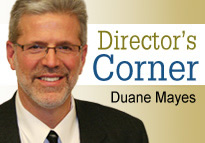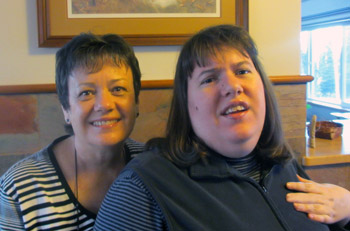SDS Express project heading out of the station!
As of Jan. 16, 2014 the contract for the Automated Service Plan project is signed and delivered. Kickoff meetings with the contractor, Harmony Information Systems, will take place in February.
The project will fold together several outdated data entry, storage and management systems into a single automated system that is secure, transparent and efficient. Providers, SDS employees and clients will eventually be able to submit documents and track the status of plans.
Automated Service Plan Project Manager Keith Burke calls the project the SDS Express.
“Hooray!” said Burke. “With this contract signing we can now get this train out of the station. We are on our way with the design, development and implementation of this new system with a completion goal of January 2015. This is an exciting time for all involved to be part of a project that will improve the efficiency and effectiveness of Senior and Disabilities Services!”
![]()
Legislative overview this session:
We'll be watching
- Employment First Act (HB 211): This bill makes integrated employment the preferred service outcome for all working-age Alaskans with disabilities.
- Extend Senior Benefits Act (HB 263): This bill extends the Senior Benefits program, which would otherwise sunset June 30, 2015.
The General Fund requests for Division of Senior & Disabilities Services in the Governor’s request held steady from last year. There are no funding increments for any new projects proposed.
![]()
PCA regulations update
The Personal Care Assistance (PCA) unit is happy to report it expects four new nurses to join its staff in March. The new help should help bring down the unit’s backlog of re-assessments, even as requests for PCA services continue to rise. More than 5,000 Alaskans used the program in fiscal year 2013, up from 3,800 in 2007.
The new hires join others hired last year, when the PCA unit filled a long-vacant reviewer position in Juneau and added five more reviewers in Anchorage, bringing the total there to 13.
The hires are one of many changes to streamline PCA processes and better serve clients since new regulations for the program were adopted in 2012.
- The unit has been hiring nurses to do initial assessments, so if a recipient decides to apply for higher level services soon after, a second assessment isn’t needed. As of March 1, all assessors will be nurses.
- PCA now uses a new Service Level Authorization, as required by law, to ensure that clients with similar needs receive similar levels of services.
- More extensive quality controls are another key part of the unit’s new procedures. Assessors are checking more medical records and other documents to make sure recipients are getting supports that match their needs.
Quality controls verify that clients are receiving quality services, and help prevent fraud. This review process makes sure that limited resources go solely to helping people with legitimate needs.
New Home and Community Services rules from CMS
The Centers for Medicare and Medicaid Services has issued new Home and Community-Based Services regulations. CMS says the rules are to boost service quality, better protect service recipients, and bring service recipients into the broader community, rather than sidelining them.
The rules are effective 60 days from January 16, 2014. CMS is giving states a year to submit a transition plan for compliance. States will have up to five years to be in full compliance.
The public will have an opportunity to comment on states’ transition plans.
The regulations move away from defining services as “home- and community-based” by where they’re delivered, and instead focus on the nature and quality of participants’ experiences. This approach keeps some focus on where services are delivered, however, because they are not to be delivered in ‘institutional’ settings.
“We’re still awaiting guidance from CMS to ensure that we fully understand the settings requirements, but our preliminary take is that they will be manageable with perhaps minor adjustments,” said SDS Deputy Director Jon Sherwood.
The biggest impact is the new requirement that plan of care development and case management (we call it care coordination) be done by entities that are not connected to providers of direct services.
There is a very limited exception when no other care coordination entity operates in the community.
SDS will meet regularly with providers and other stakeholders as we get more details on the new rules, and we’ll figure out together how to make them work for Alaskans.
For more information, including the rule and fact sheets, visit http://www.medicaid.gov/Medicaid-CHIP-Program-Information/By-Topics/Long-Term-Services-and-Support/Home-and-Community-Based-Services/Home-and-Community-Based-Services.html
![]()
Two decades of Medicaid waivers in Alaska
For the past two decades, Alaskans who need an institutional level of care have been able to get services at home and in the community that they formerly could only get in facilities such as nursing homes. They and their families have Medicaid waivers to thank for the change… and the Alaskans who worked to get the waivers granted from the Centers for Medicare & Medicaid Services.
|
“My daughter has the opportunity to learn and work and be a part of the wonderful things that life has to offer everyone” because of her Intellectual & Developmental Disabilities waiver, said Kathy Fitzgerald, describing what the waiver has meant to her family. She said her daughter Kara, 31, has blossomed despite a severe disability. “What a tremendous feeling that your loved one isn’t going to be in an institution. We have a state that provides for community thanks to waivers.”
Some 4,900 Alaskans currently receive services through four waivers, including waivers for children with complex medical conditions, and Alaskans of any age with physical disabilities that meet the waiver level-of-care needs requirements.
These programs make sense in both human terms and financial terms.
In a recent presentation to the legislature, SDS Division Director Duane Mayes demonstrated the importance of the program to Alaska by showing a comparison between actual costs for home- and community-based services and what the same services would’ve cost in an institutional setting. The cost was $331 million instead of $759 million.
The savings stretch limited resources further, and allow more Alaskans to receive support.
![]()
Training update
Several classes are available online or in-person in Anchorage in February and March.
For more information, visit the training page:
http://dhss.alaska.gov/dsds/Pages/ops/senior-disabilities-servicetraining.aspx
or see the schedule: http://dhss.alaska.gov/dsds/Documents/carecoordinationtraining/
trainingregistration_form.pdf
![]()
New Central Intake fax for Critical Incident Reports
SDS now has a high capacity Central Intake fax machine to receive Critical Incident Reports. Please send all CIRs to (907) 269-3648. Thank you.



